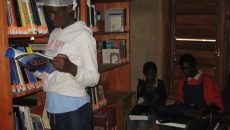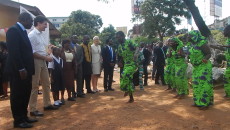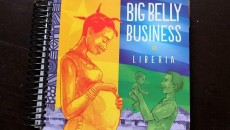This article was sponsored by the We Care Foundation
MONROVIA, Montserrado – The We Care Foundation, an NGO working in the education sector, has announced a list of new partnerships that are meant to improve the quality of learning in Liberia.
We Care Foundation’s executive director, T. Michael Weah, announced that the charity is poised to kick off full implementation of a Girls Accelerated Learning Initiative through a partnership with the Canadian Organization for Development.
According to the UNDP’s Human Development Index, Liberia as one of the most disadvantaged countries in the world, with a rank of 177 out of 188. The report indicates that almost all primary students in the country are too old for their grade. It says girls, in particular, are more vulnerable and at a greater risk of dropping out of school due to lack of self-esteem or because they are pulled into the labor market to financially support their family.
They are also at risk due to early pregnancy, early marriage, or repeated sexual harassment. Just 17.3 percent of adult women in Liberia have reached at least a secondary level of education.
Weah said the Girls Accelerated Learning Initiative supports over-age girl students to accelerate their learning to help them advance to an age-appropriate grade.
“We’re trying to work with them in such a way that they can be promoted once or twice a year,” he said.
“From our own assessment, we noticed that if this girl can read and do basic numeracy, you can push her as far as you can, because she’s going to do social studies, science, and other things in the elementary grades – it’s just reading.”
Weah disclosed that the Canadian Organization for Development is also partnering with his organization to introduce technology in the learning process by providing computer tablets to primary schools where students can access lessons.
“These computer tablets will be in two schools in Kakata. That’s where the program will be and there will be about to 48 to 60 tablets that will be in these classrooms,” he said.
He hopes that the program will be expanded into other schools in the future.
During the first year of the pilot program in 2018, Weah said 173 over-age girls in grades 1-6 were enrolled across five schools that were also in the Read Liberia program. Every specialized teacher in the program was assigned 10 overage girls in the after-school program to improve their reading, writing, and mathematics skills.
During the second year in 2019, Weah said the program was expanded to 25 schools, with increased results in terms of academic performance. During the ensuing school year, the program will enroll an additional 375 girls in about 25 schools in Bomi, Margibi, Grand Bassa, and Montserrado.
For the past five years, We Care Foundation has also partnered with the Friends of Liberia to implement the Family Learning Initiative, a 30-week home literacy program meant to train parents to provide home education for their young out of school children.
In the slum communities of Caldwell, Duazon, and West Point, home visitors through the program train parents in basic teaching skills, while the parents in turn teach their own children how to read, write, and identify shapes and colors. The HIPPY curriculum, which the program uses, prepares children in the three-year program to be ready for first grade in regular school at age six to compete with others who are currently enrolled in pre-primary schools.
Weah said the Open Society Initiative of West Africa was funding the expansion of the program to include a nurturing care component for children that will be enrolled in the program in Paynesville’s Neezoe community.
With its new component, he said the program’s package will now go beyond education to include the child’s wellbeing, health, and other social amenities.
“The home visitors are part of it but we’re also in partnership with other organizations like Public Health Initiative Liberia,” he said.
According to him, the initiative is an evidence-based approach program and will be used to collect data that will inform policies on how the program can be expanded and improved.
These different programs according to him are meant to improve the outcome of learning in the country.
This article was sponsored by the We Care Foundation. Featured photo by Gbatemah Senah



